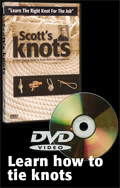Navigation Lights
The following illustrate the required navigation lights as described in the International Regulations for Preventing Collisions at Sea along with some memory aids and real world notes.
Every effort has, and is being made to ensure the accuracy of this information and to continue to add aditional real world notes and examples - should you have any comments, corrections, or suggestions please contact us
Vessels Under Way & Making Way
Sailing Vessel
| aft | forward | starboard |
|---|---|---|
 |
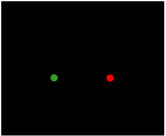 |
 |
Sailing Vessel
see Rule #25
see Rule #25
Power Vessel < 50m
| aft | forward | starboard |
|---|---|---|
 |
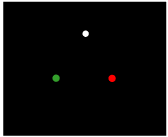 |
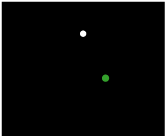 |
Power Vessel, < 50m in length
see Rule #23
see Rule #23
Power Vessel > 50m
| aft | forward | starboard |
|---|---|---|
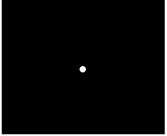 |
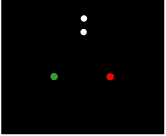 |
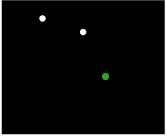 |
either
see Rule #23
- Power Vessel, > 50m in length
- Power Vessel, < 50m in length (displaying the optional second masthead light)
see Rule #23
the use of a second masthead light is optional for power vessels under 50m
{Rule 23(a)(ii)}
{Rule 23(a)(ii)}
When seen from forward it is impossible to distinguish this from a towing vessel < 50m with tow < 200m
Towing Vessel < 50m (tow < 200m)
| aft | forward | starboard |
|---|---|---|
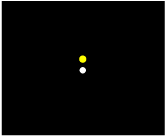 |
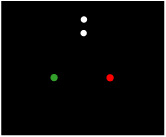 |
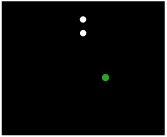 |
Towing Vessel < 50m (tow < 200m)
see Rule #24
see Rule #24
the use of a second masthead light is optional for power vessels under 50m
{Rule 23(a)(ii)}
{Rule 23(a)(ii)}
When seen from forward it is impossible to distinguish this from a power vessel > 50m (or a power vessel < 50m showing the optional second masthead light)
Towing Vessel > 50m (tow < 200m)
| aft | forward | starboard |
|---|---|---|
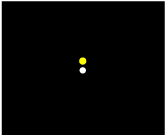 |
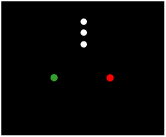 |
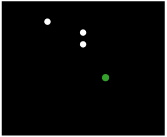 |
either
see Rule #24
- Towing Vessel > 50m in length with tow < 200m
- Towing Vessel < 50m in length (displaying the optional second masthead light) with tow < 200m
see Rule #24
the use of a second masthead light is optional for power vessels under 50m
{Rule 23(a)(ii)}
{Rule 23(a)(ii)}
When seen from forward or aft it is impossible to distinguish this from a towing vessel < 50m with a tow > 200m
Towing Vessel < 50m (tow > 200m)
| aft | forward | starboard |
|---|---|---|
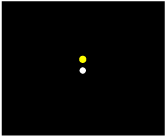 |
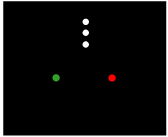 |
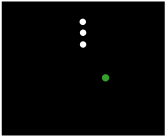 |
Towing Vessel < 50m (tow > 200m)
see Rule #24
see Rule #24
When seen from forward or aft it is impossible to distinguish this from a towing vessel > 50m with a tow < 200m
Towing Vessel > 50m (tow > 200m)
| aft | forward | starboard |
|---|---|---|
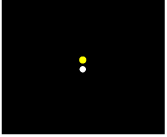 |
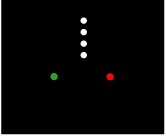 |
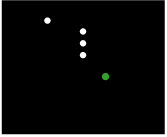 |
either
see Rule #24
- Towing Vessel > 50m in length with tow > 200m
- Towing Vessel < 50m in length (displaying the optional second masthead light) with tow > 200m
see Rule #24
the use of a second masthead light is optional for power vessels under 50m
{Rule 23(a)(ii)}
{Rule 23(a)(ii)}
Pushing Vessel < 50m
| aft | forward | starboard |
|---|---|---|
 |
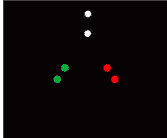 |
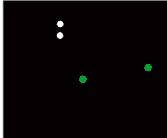 |
Pushing Vessel < 50m
see Rule #24
see Rule #24
The exact orientation of the sidelights seen from forward may be different (the pushed vessel may obscure the sidelights of the pushing vessel entirely)
It is a common mistake to confuse normal pushing operations with that involving a composite unit. If it were a composite unit (ie: built for puishing and rigidly connected), it would be lit as a single vessel.
Fishing Vessel
| aft | forward | starboard |
|---|---|---|
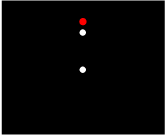 |
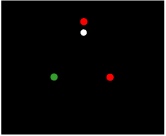 |
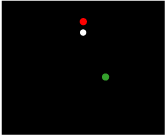 |
Fishing Vessel
see Rule #26
see Rule #26
Memory Aid: "Red Over White = Fishing At Night"
Fishing Vessel: when hampered by purse seine gear
| aft | forward | starboard |
|---|---|---|
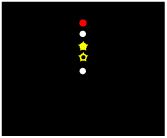 |
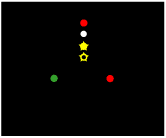 |
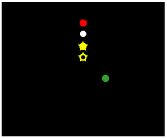 |
Fishing Vessel: when hampered by purse seine gear
see Rule #26
see Rule #26
the yellow lights are equal interval alternate 1s flashing lights
{See Annex II part 3}
{See Annex II part 3}
Expect this vessel to be traveling in a circle or possibly making stern-way - there will also usually be a small outboard in operation as well.
Trawling Vessel
| aft | forward | starboard |
|---|---|---|
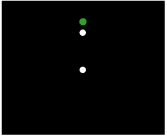 |
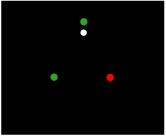 |
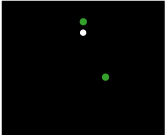 |
Trawling Vessel
see Rule #26
see Rule #26
Memory Aid: "Green Over White = Trawling At Night"
Trawling Vessel Shooting Nets
| aft | forward | starboard |
|---|---|---|
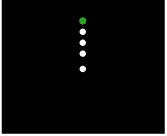 |
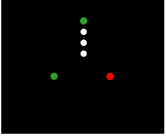 |
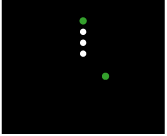 |
Trawling Vessel Shooting Nets
see Rule #26
see Rule #26
Memory Aid: "Green Over White = Trawling At Night"
{See Annex II part 3}
{See Annex II part 3}
Trawling Vessel Hauling Nets
| aft | forward | starboard |
|---|---|---|
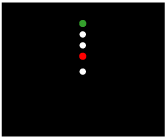 |
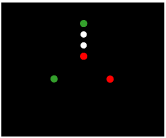 |
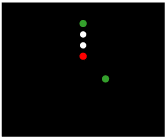 |
Trawling Vessel Hauling Nets
see Rule #26
see Rule #26
Memory Aid: "Green Over White = Trawling At Night" and the Red for hauling means the vessel may be stopped or proceeding backwards
{See Annex II part 3}
{See Annex II part 3}
Vessel engaged in pilotage duties
| aft | forward | starboard |
|---|---|---|
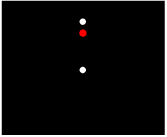 |
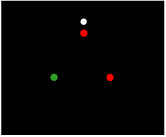 |
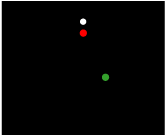 |
Vessel engaged in pilotage duties
see Rule #29
see Rule #29
Memory Aid: "White over Red = Pilot Ahead"
Vessels Not Under Way
Vessel < 50m At Anchor
| aft | forward | starboard |
|---|---|---|
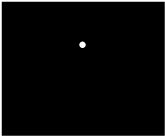 |
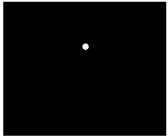 |
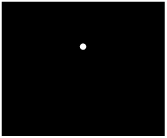 |
Vessel < 50m At Anchor
see Rule #30
see Rule #30
Remember, it is impossible to tell in many cases when only a single white light is seen - what this may mean (stern light? vessel at anchor? distant vessel where only the masthead light is visible over the horizon? etc...)
Vessel > 50m At Anchor
| aft | forward | starboard |
|---|---|---|
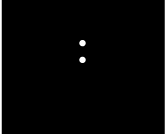 |
 |
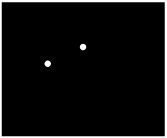 |
either
see Rule #30
- Vessel > 50m in length at anchor
- Vessel < 50m in length at anchor (displaying the optional second allround white light)
see Rule #30
Vessel Aground
| aft | forward | starboard |
|---|---|---|
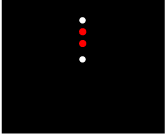 |
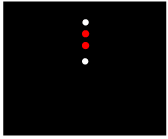 |
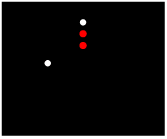 |
Vessel Aground
see Rule #30
see Rule #30
For a vessel < 50m only one white anchor light may be shown.
Memory Aid: lights for a vessel aground are identical to those for a vessel at anchor with the addition of the two red lights.
Memory Aid: lights for a vessel aground are identical to those for a vessel at anchor with the addition of the two red lights.
Since the rule does not specify exactly where the two red lights should appear in relation to the anchor light they may appear either above or below the forward anchor light.
Vessel Aground (alternate posibility)
| aft | forward | starboard |
|---|---|---|
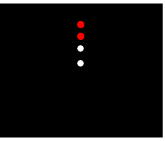 |
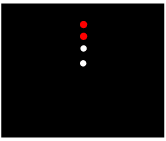 |
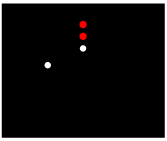 |
Vessel Aground (alternate posibility)
see Rule #30
see Rule #30
For a vessel < 50m only one white anchor light may be shown.
Memory Aid: lights for a vessel aground are identical to those for a vessel at anchor with the addition of the two red lights.
Memory Aid: lights for a vessel aground are identical to those for a vessel at anchor with the addition of the two red lights.
Since the rule does not specify exactly where the two red lights should appear in relation to the anchor light they may appear either above or below the forward anchor light.
Vessels Restricted in Their Ability to Maneuver
Vessel Restricted in Her Ability To Maneuver > 50m in length or < 50, in length showing the optional second masthead light.
| aft | forward | starboard |
|---|---|---|
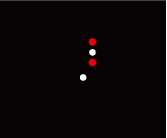 |
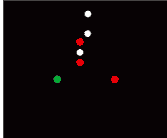 |
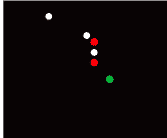 |
Vessel Restricted in Her Ability To Maneuver > 50m in length or < 50, in length showing the optional second masthead light.
see Rule #27
see Rule #27
Since being restricted in their ability to maneuver is always "due to the nature of her work" many vessels will also display other lights. However, if the lights are not shown (with the exception of mineclearence) the vessel is not afforded any special consideration.
The specific location of the Red, White, Red lights is flexible within the provision of the rule
Vessel Restricted in Her Ability To Maneuver Towing < 50m in length with tow < 200m
| aft | forward | starboard |
|---|---|---|
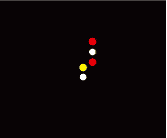 |
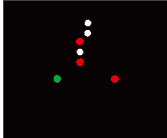 |
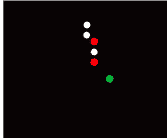 |
Vessel Restricted in Her Ability To Maneuver Towing < 50m in length with tow < 200m
see Rule #27
see Rule #27
Per the rule this applies to a power-driven vessel engaged in a towing operation that severely restricts the towing vessel and her tow in their ability to deviate from their course
In practise few towing vessels display these lights despite being severly restricted in their ability to maneuver ie: towing a log boom.
Vessel Restricted in Her Ability To Maneuver Towing > 50m in length with tow < 200m
| aft | forward | starboard |
|---|---|---|
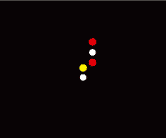 |
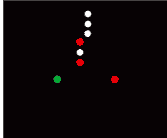 |
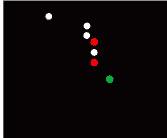 |
Vessel Restricted in Her Ability To Maneuver Towing > 50m in length with tow < 200m
see Rule #27
see Rule #27
Per the rule this applies to a power-driven vessel engaged in a towing operation that severely restricts the towing vessel and her tow in their ability to deviate from their course
In practise few towing vessels display these lights despite being severly restricted in their ability to maneuver ie: towing a log boom.
Vessel Restricted in Her Ability To Maneuver conducting underwater operations where an obstruction exists
| aft | forward | starboard |
|---|---|---|
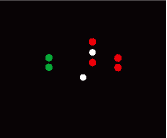 |
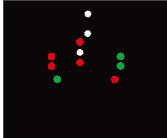 |
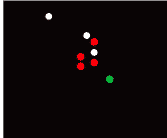 |
Vessel Restricted in Her Ability To Maneuver conducting underwater operations where an obstruction exists
see Rule #27
see Rule #27
Memory Aid: In the case of an obstruction "Green means go" the red pair indicate there is an obstruction on that side.
In practise, there would probably be some kind of notice issued (Notice To Shipping) in these cases.
Special Cases
Vessel Constrained by her Draft
| aft | forward | starboard |
|---|---|---|
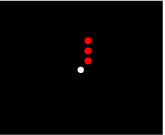 |
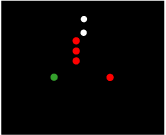 |
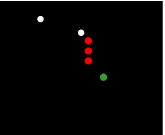 |
Vessel Constrained by her Draft
see Rule #27
see Rule #27
The specific location of the 3 all round red lights is flexible within the provision of the rule
Vessel engaged in mine clearance operations
| aft | forward | starboard |
|---|---|---|
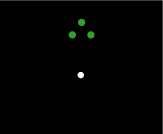 |
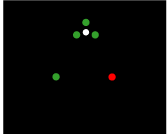 |
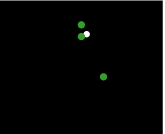 |
Vessel engaged in mine clearance operations
see Rule #27
see Rule #27
When seen from the side the far allround green light may be obscured by rigging or by the near allround green light (as seen in the starboard view of this example)


